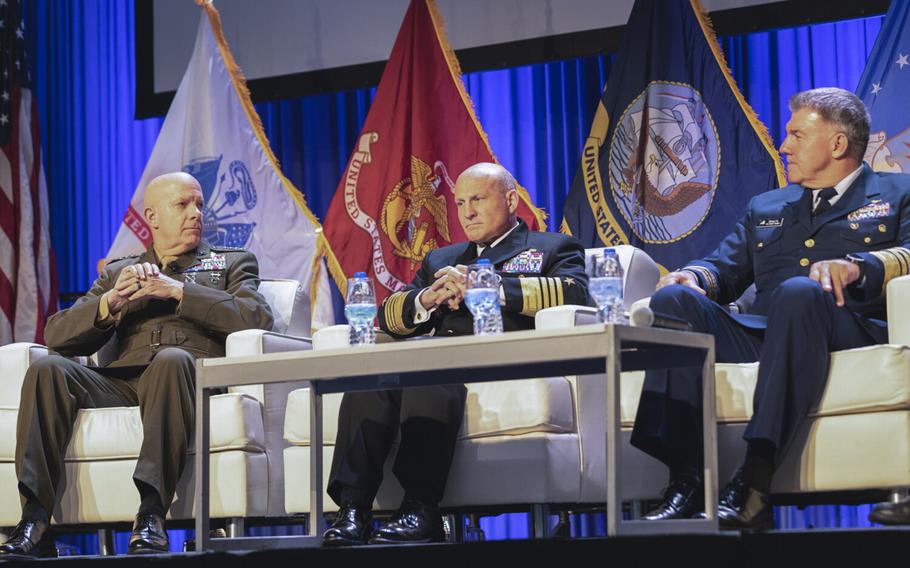
Marine Corps Commandant Gen. David Berger, Chief of Naval Operations Adm. Mike Gilday, and Coast Guard Commandant Adm. Karl Schultz during the West 2022 conference at the San Diego Convention Center on Friday, Feb. 18, 2022. (TNS)
Stars and Stripes is making stories on the coronavirus pandemic available free of charge. See more stories here. Sign up for our daily coronavirus newsletter here. Please support our journalism with a subscription.
(Tribune News Service) — The great pandemic resignation and a shift toward recruiting older, more skilled military service members was major theme at the keynote panel that wrapped up the WEST 2022 conference in San Diego on Friday.
Chief of Naval Operations Adm. Mike Gilday, Marine Corps Commandant Gen. David Berger and Coast Guard Commandant Adm. Karl Schultz addressed a room of largely military contractors, laying out in broad terms their take on a host of issues, most notably the need to enlist cyber security and other experts.
Berger — who in November, released a new plan for overhauling how the Marine Corps recruits and retains its personnel — said civilians leaving their jobs as the COVID-19 pandemic leads them to reassess how they spend their work hours, and what they get paid for it, provides an opportunity for the military.
“We shouldn’t look at this resignation as a big negative,” he said. “Fine, they’re unhappy with their jobs. Our recruiters are going to be right there.”
Under Berger’s new vision, the Marine Corps will look to reverse the high turnover that’s come with targeting younger, unskilled recruits. Instead, the service will focus on people with experience, particularly in cyber security and other technology fields, creating pathways for entry that don’t require starting at the bottom. Military families have seen consistent pay raises of at least 2.5 percent a year since 2018.
“We have always been a very young force,” he said. “We can’t do that going forward, for a lot of reasons. We’re not giving up on the high school graduate, but we have to reach a better balance in our force.”
Held at the San Diego Convention Center, the three-day event featured a wide array of military technology. Corporate war contractors from Lockheed Martin, Northrop Grumman and Boeing to Verizon and AT&T showed off everything from robotic dogs to the latest drones, or as the military has dubbed them, unmanned aeronautical vehicles.
The Coast Guard, which boasts the highest retention in the armed services, has also had challenges bringing in new recruits, Schultz said at the event. Retention has been up across the branches during the pandemic.
“I think we find ourselves in a competitive environment,” he said. “We don’t have the deepest pockets, so I don’t through a lot of bonuses young men and women’s ways. But we’re getting great young men and women.”
As the need for cyber-security expertise has increased, the military has also started targeting new recruits online, said Gilday with the Navy, which met its recruitment targets last year.
“We’ve shifted our marketing from TV to online,” he said. “We’ve tried to show them what sailors are doing day-to-day, real life. That’s been fairly effective for us. That outreach is really important.”
WEST bills itself as the “premier” naval conference on the West Coast, drawing up to 7,000 people to San Diego annually. Now in its 32nd year, the event is co-sponsored by AFCEA International and the U.S. Naval Institute.
___
©2022 The San Diego Union-Tribune.
Visit sandiegouniontribune.com
Distributed by Tribune Content Agency, LLC.